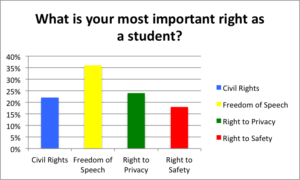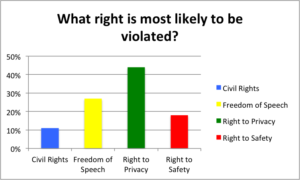Mabel Kabani, editor-in-chief
 “My math teacher sent me down to the office with a pink slip. I was so scared and so nervous; I was such a shy student,” Mary Beth Tinker, a former Supreme Court plaintiff, said. “My advisor told me that I had to take off my armband. I did, but I was still suspended.”
“My math teacher sent me down to the office with a pink slip. I was so scared and so nervous; I was such a shy student,” Mary Beth Tinker, a former Supreme Court plaintiff, said. “My advisor told me that I had to take off my armband. I did, but I was still suspended.”
Tinker was only in eighth grade when she first spoke out against the war in Vietnam by wearing a black armband to school, in an act that was against Harding Middle School policy.
“I was the only student to wear the armband,” Tinker said. “But it is important to do what you’re passionate about over what is popular, because popularity fades with time.”
After she was suspended, Tinker took her freedom of speech case from Iowa to the Supreme Court in Washington D.C., and the case, Tinker v. Des Moines, became one that would protect the freedom of speech of students attending public schools.
Now, 44 years later, Tinker and Student Press Law Center (SPLC) Attorney Mike Hiestand are touring across the country and promoting the importance of freedom of speech in schools all over America.
“We started [the tour] at the Liberty Bell on Constitution Day in September, and made 50 different stops, mostly on the east coast,” Hiestand said. “I believe that young voices are essential, and the only way students will speak out is if they know their rights, which is the goal of the Tinker Tour: to alert students of their rights and encourage them to take advantage of those rights.”
According to Hiestand, issues with censorship are the number one reason students contact SPLC.
Senior Sydney Sutherland, from Melbourne, Fla., believes that her school “restricts [them] from doing everything.”
“My school keeps everyone from doing anything or from having any kind of freedom in every aspect of our lives,” Sutherland said. “I’m an anchor on the broadcast staff, and whenever I suggest edgy ideas, nobody really vouches for them because they are all afraid of the administration.”
She continues to say that though she is a “strong-willed woman,” her course of action is limited because her school prohibits her from covering controversial topics.
“I appreciate a student’s right to freedom of speech more and more after each dejected story idea,” Sutherland said.
According to a poll on beverlyhighlights.com, 36 percent of students at Beverly Hills High School (BHHS) believe that freedom of speech is a student’s most valued and important right.

Some Beverly students believe that BHHS does a fair job of creating an environment that fosters freedom of speech.
“I think our school does a pretty good job of creating an environment that encourages students to speak their mind,” senior Paloma Bloch said. “Though the administration does often discourage scandalous stories from being published on the school paper, it does so subtly and their opinions don’t affect what the paper publishes.”
Junior Timothy Choi agrees with Bloch and is thankful that “our school is a public one and thusly can’t exercise prior review.”

Houstonian John Michael Cuccia is a journalism advisor for a private school that does not require prior review, a process in which executive members must review materials before they are published.
“Our school is unusual in that our administration chooses not to exercise prior review,” Cuccia said. “However, sensitive articles are run by the administration. It’s just an understanding we have.”
Unlike Cuccia, local Bostonion college student Skylar Burge was surrounded in her primary education by an academic environment where students had to understand that “you didn’t say certain things.”
“I attended a predominantly white Catholic school,” Burke said. “As a black woman, it was hard for me to express myself.”
Burke recounted an experience in which her grade watched President Barack Obama’s inauguration and she could “feel the hatred in the room,” and was embarrassed to share her feelings of joy with the rest of her classmates.
“People should always be allowed to say what they feel,” Burke said. “This is America and the first amendment is something that we truly value here and students should not be exempt from that law.”
Though Tinker v. Des Moines has impacted students and the way they can now express themselves in public schools, there are always instances in which school administration and its environment can stifle the voices of students.
“The Tinker Tour and the court case is just one instance in millions where students fight for their rights; there is much more to come and much more to advocate for,” Hiestand said. “Tinker Tour is just one drop in the bucket.”
[slideshow_deploy id=’8255′]
We asked student journalists and citizens of Boston about their experiences with violations of free speech:




























